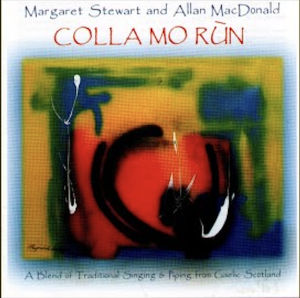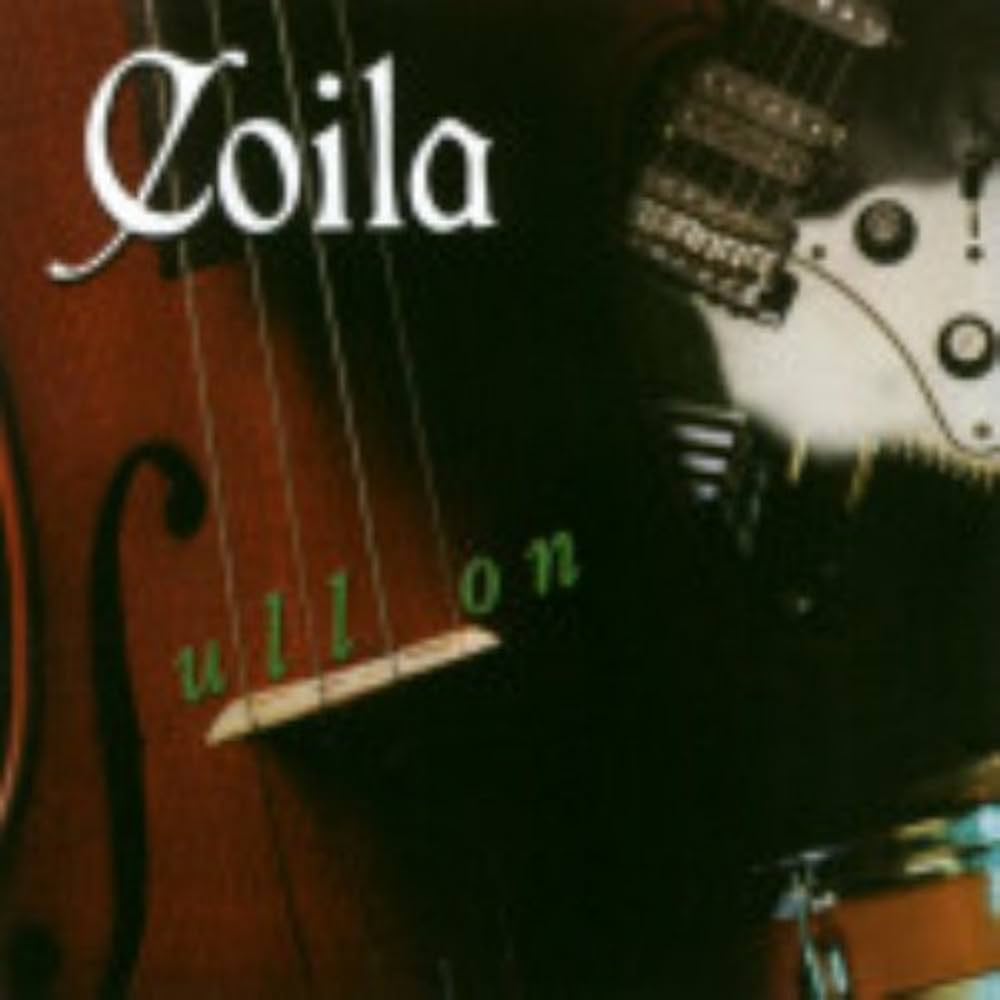“The object of my affection is the white shanked heifer / She doesn’t need a fetter around her shanks…”
Some people come home, pour a martini, and throw on some jazz. Others, however, put on Scottish music and feel the blood of their dour, but thrifty, literate, and inventive ancestors pulse invigoratingly through their veins. Here are three great and relaxing albums from the Land of Sheep In the Road.
Coila is a progressive traditional instrumental band from Ayrshire. The lineup is fairly conventional and as is common this excellent band is semi-professional. Most of what we hear in Full On is fiddle, accordion, and whistle, sometimes subtle keyboards, but on certain tracks Coila adds, among others, the pipes of Dougie Pincock and the harp of Karen Connor. Only a few of the tunes are traditional; most are composed in traditional style by members of the band, or are cover tunes by Donald Shaw, Phil Cunningham, Grey Larsson, Liz Carroll or, drilling for the murky waters of time past, by Archie Kenneth and the legendary J. Scott Skinner.
Most is spirited dance music, but the amount of progressive (i.e., a little jazz, a little rock…) modernization varies. Similar to various other modern bands, drums and electric bass play against master fiddler Alistair McCulloch in a gentle tug-of-new and old. “The 5 A.M. Ceili,” composed to keep the band awake at an all-night dance, stands out with its “funky guitar licks” and modern percussion. Skinner’s “Herr Roloff’s Farewell,” gets a “tasteful,” yet surely up-to-date, string quartet accompaniment. The tracks follow one another smoothly.
 Drinkers Drouth’s A Tribute isn’t the multi-artist tribute to the late Davy Steele that one might expect, but rather is a re-release of two albums from the band that Davy played with in the 1980s: When the Kye Comes Home (1982) and Bound To Go (1984). Composed mostly of vocal tracks and performed in a style that speaks of the ’80s, the band is really good and it’s unfortunate that it took a tragedy for the recordings to be released on CD. It’s also unfortunate that there is so little information on the band in the booklet that even the home port and instruments of the members are not given! The members included Tony and Brian Dougan, David Black, and Tony Aiken, as well as (more briefly) Davy Steele.
Drinkers Drouth’s A Tribute isn’t the multi-artist tribute to the late Davy Steele that one might expect, but rather is a re-release of two albums from the band that Davy played with in the 1980s: When the Kye Comes Home (1982) and Bound To Go (1984). Composed mostly of vocal tracks and performed in a style that speaks of the ’80s, the band is really good and it’s unfortunate that it took a tragedy for the recordings to be released on CD. It’s also unfortunate that there is so little information on the band in the booklet that even the home port and instruments of the members are not given! The members included Tony and Brian Dougan, David Black, and Tony Aiken, as well as (more briefly) Davy Steele.
The album is almost an encyclopedia of Scottish traditional songs: great songs with those wonderful chunky arrangements and astounding harmonies from the heyday of Battlefield, the Tannies, and Silly Wizard. Often there are slow songs, like “When the Kye Comes Home,” but all are somehow driven by that inimitable dark force of lochs and heather that makes us so proud to be washed in the blood of Bruce and Wallace. Some vocals are by Davy, some not, but they are always good, and sometimes we hear fine, bright bouzouki though there is no telling the player. As predicted, a heavy, plodding “Cam Ye Ower Frae France” with its perky bright setmate “The Store Cheque” is a sure bet, as is the following and equally heavy “Wha ll Dreg A Buckie,” a Steele original…referencing his native Prestonpans. Amazing harmonies, string-heavy, not a dance band, but nevertheless full of their own sort of energy.
[You can read our reviews of Battlefield Band’s Leaving Friday Harbor and Rain Hail Or Shine. These were recorded when Davy Steele was in the lineup.]
 What could be as fine as an opening blast from the highland pipes??? Why, Gaelic singing! What a windfall! Colla Mo Rùn (or Piper’s Warning To His Master) is the second album by Lewis Gaelic singer Margaret Stewart and piper Allan MacDonald, brother to piper Iain MacDonald who plays back-up on the album. The MacDonald’s are from Moidart, a semi-island located on the coast due west of Fort William. Though mostly traditional, Colla Mo Rùn is more dedicatedly a studio production than the other two items reviewed, more of a clean sound than energy album. It is successful at this and pretty as well. I guess, though, what I mean is you wouldn’t be putting your feet up in a pub with a bunch of drunks in order to listen, unless they had already passed out. (But being indigenous musicians, I bet Stewart and MacDonald would counter smugly “We perform for drunks all the time!”)
What could be as fine as an opening blast from the highland pipes??? Why, Gaelic singing! What a windfall! Colla Mo Rùn (or Piper’s Warning To His Master) is the second album by Lewis Gaelic singer Margaret Stewart and piper Allan MacDonald, brother to piper Iain MacDonald who plays back-up on the album. The MacDonald’s are from Moidart, a semi-island located on the coast due west of Fort William. Though mostly traditional, Colla Mo Rùn is more dedicatedly a studio production than the other two items reviewed, more of a clean sound than energy album. It is successful at this and pretty as well. I guess, though, what I mean is you wouldn’t be putting your feet up in a pub with a bunch of drunks in order to listen, unless they had already passed out. (But being indigenous musicians, I bet Stewart and MacDonald would counter smugly “We perform for drunks all the time!”)
In accordance with the production standards, there is a wise diversity in Colla Mo Rùn. Some of the Gaelic songs are ballads; “Sean Duine Cha Ghabh Mi Idir” (“An Old Man I Shall Not Have”) comes to the front as a call and response walking song, though with percussion rather than the beloved “whumping” of cloth. But the real star here is the title track, on which Margaret’s vocals run parallel with Allan’s smallpipes, both at times a flurry of grace notes. Usually it is Margaret who sings in a sweet, lilting voice; Allan’s solo Gaelic is heard on a song translated as “You Are Dear To Me.” Allan’s forte, though, is instrumentals, sometimes a cheerful original set on smallpipes with a pick-up band (“We’re A Case the Bunch Of Us”), sometimes, as the end piece, a slow lament on highland pipes for, more sadly than bitterly, the forced demise of Gaeldom. However, judging from these recordings, Gaeldom has managed to rally and live on.
(Lochshore, 2001)
(Greentrax, 2001)
(Greentrax, 2001)

